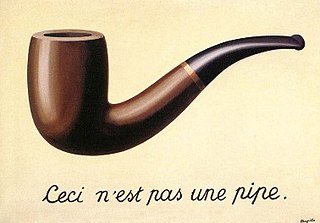
Surrealism is a cultural movement that developed in Europe in the aftermath of World War I in which artists depicted unnerving, illogical scenes and developed techniques to allow the unconscious mind to express itself. Its aim was, according to leader André Breton, to "resolve the previously contradictory conditions of dream and reality into an absolute reality, a super-reality", or surreality. It produced works of painting, writing, theatre, filmmaking, photography, and other media.

Raymond Queneau was a French novelist, poet, critic, editor and co-founder and president of Oulipo, notable for his wit and cynical humour.

André Robert Breton was a French writer and poet. He is known best as the co-founder, leader, and principal theorist of surrealism. His writings include the first Surrealist Manifesto of 1924, in which he defined surrealism as "pure psychic automatism".

Antoine Marie Jean-Baptiste Roger, comte de Saint-Exupéry, simply known as Antoine de Saint-Exupéry, was a French writer, poet, aristocrat, journalist and pioneering aviator. He became a laureate of several of France's highest literary awards and also won the United States National Book Award. He is best remembered for his novella The Little Prince and for his lyrical aviation writings, including Wind, Sand and Stars and Night Flight.

René Daumal was a French spiritual para-surrealist writer, critic and poet, best known for his posthumously published novel Mount Analogue (1952) as well as for being an early, outspoken practitioner of pataphysics.
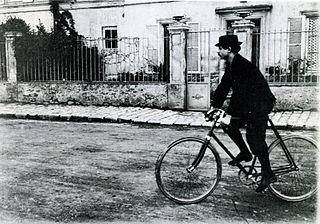
'Pataphysics is a "philosophy" of science invented by French writer Alfred Jarry (1873–1907) intended to be a parody of science. Difficult to be simply defined or pinned down, it has been described as the "science of imaginary solutions".
Léo Malet was a French crime novelist and surrealist.
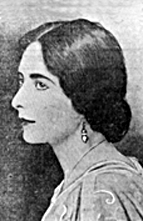
Mina Loy was a British-born artist, writer, poet, playwright, novelist, painter, designer of lamps, and bohemian. She was one of the last of the first-generation modernists to achieve posthumous recognition. Her poetry was admired by T. S. Eliot, Ezra Pound, William Carlos Williams, Basil Bunting, Gertrude Stein, Francis Picabia, and Yvor Winters, among others. As stated by Nicholas Fox Weber in the New York Times, "This brave soul had the courage and wit to be original. Mina Loy may never be more than a vaguely familiar name, a passing satellite, but at least she sparkled from an orbit of her own choosing."
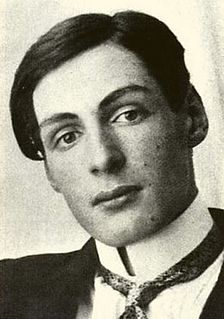
Arthur Cravan was a Swiss writer, poet, artist and boxer. He was the second son of Otho Holland Lloyd and Hélène Clara St. Clair. His brother Otho Lloyd was a painter and photographer married to the Russian émigré artist Olga Sacharoff. His father's sister, Constance Mary Lloyd, was married to Irish poet Oscar Wilde. He changed his name to Cravan in 1912 in honour of his fiancée Renée Bouchet, who was born in the small village of Cravans in the department of Charente-Maritime in western France.
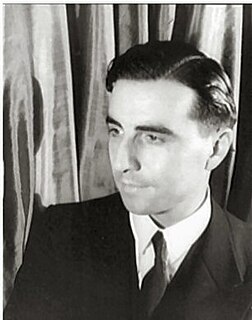
Julien Green was an American writer who authored several novels, a four-volume autobiography and his famous Diary. He wrote primarily in French and was the first non-French national to be elected to the Académie française.

The Bibliothèque de la Pléiade is a French editorial collection which was created in 1931 by Jacques Schiffrin, an independent young editor. Schiffrin wanted to provide the public with reference editions of the complete works of classic authors in a pocket format. André Gide took an interest in Schiffrin's project and brought it into Gallimard, under which imprint it is still published.

Saint-Julien-le-Pauvre, in full Église Saint-Julien-le-Pauvre, is a Melkite Greek Catholic parish church in Paris, France, and one of the city's oldest religious buildings. Built in Romanesque style during the 13th century, it is situated in the 5th arrondissement, on the Left Bank of the Seine River, about 500 meters away from the Musée de Cluny and in the proximity of the Maubert-Mutualité Paris Métro station. It shares a city block with the Square René Viviani.
Clinamen is the Latin name Lucretius gave to the unpredictable swerve of atoms, in order to defend the atomistic doctrine of Epicurus. In modern English it has come more generally to mean an inclination or a bias.

Jacques Rigaut was a French surrealist poet. Born in Paris, he was part of the Dadaist movement. His works frequently talked about suicide and he came to regard its successful completion as his occupation. In 1929 at the age of 30, as he had announced, Rigaut shot himself, using a ruler to be sure the bullet would pass through his heart.

Jacques Vaché was a friend of André Breton, the founder of surrealism. Vaché was one of the chief inspirations behind the Surrealist movement. As Breton said:

Experimental literature is a genre that is, according to Warren Motte in his essay "Experimental Writing, Experimental Reading", "difficult to define with any sort of precision." He says the "writing is often invoked in an "offhand manner" and the focus is on "form rather than content." It can be in written form of prose narrative or poetry, but the text may be set on the page in differing configurations than that of normal prose paragraphs or in the classical stanza form of verse. It may also be entwined with images of a real or abstract nature, with the use of art or photography. Furthermore, while experimental literature was traditionally handwritten on paper or vellum, the digital age has seen an exponential leaning to the use of digital computer technologies.

The Anthology of Black Humor is an anthology of 45 writers edited by André Breton. It was first published in 1940 in Paris by Éditions du Sagittaire and its distribution was immediately banned by the Vichy government. It was reprinted in 1947 after Breton's return from exile, with a few additions. In 1966, Breton, "having resisted the temptation to add more names", published the book again and called this edition "the definitive".
Fulcanelli was the name used by a French alchemist and esoteric author, whose identity is still debated. The name Fulcanelli seems to be a play on words: Vulcan, the ancient Roman god of fire, plus El, a Canaanite name for God and so the Sacred Fire.
Jean Sarment, real name Jean Bellemère, was a French film and stage actor and a writer. He was nominated administrator of the Comédie-Française in July 1944 although he won't occupy the position.
Jacques Robert was a French author, screenwriter and journalist.















